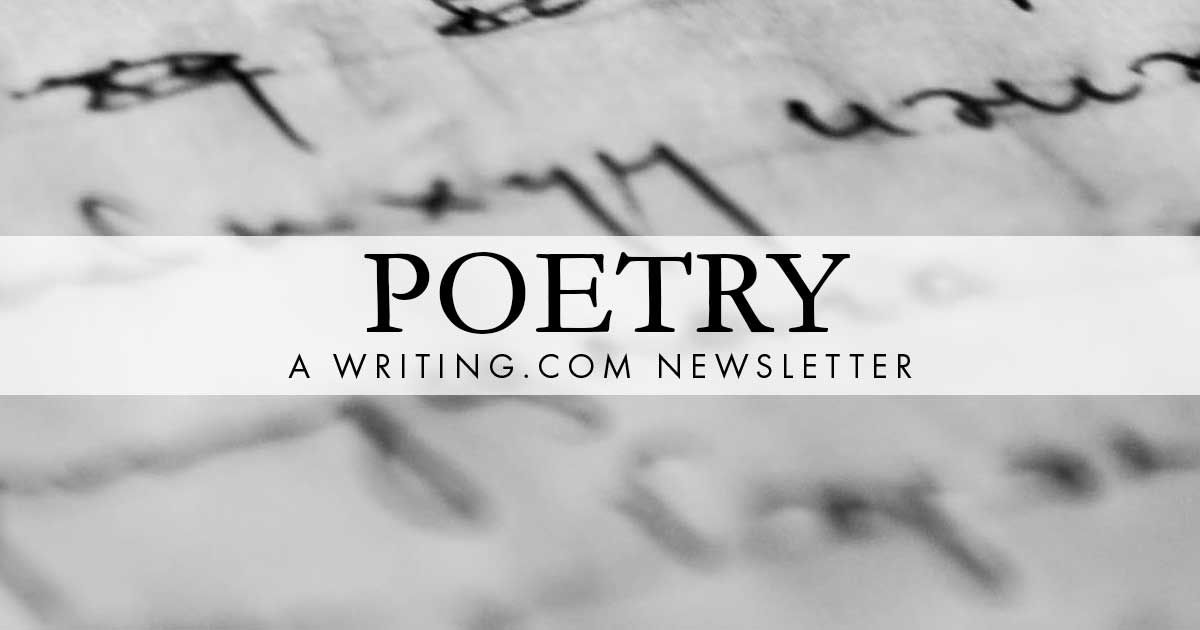This week: New Year New Poetry? Edited by: Red Writing Hood <3  
More Newsletters By This Editor 
![Table of Contents [#401437]
Table of Contents](https://shop.Writing.Com/main/trans.gif) ![Table of Contents [#401437]
Table of Contents Table of Contents](/main/images/action/display/ver/1709303267/item_id/401437.png)
1. About this Newsletter
2. A Word from our Sponsor
3. Letter from the Editor
4. Editor's Picks
5. A Word from Writing.Com
6. Ask & Answer
7. Removal instructions
![About This Newsletter [#401439]
About This Newsletter](https://shop.Writing.Com/main/trans.gif) ![About This Newsletter [#401439]
About This Newsletter About This Newsletter](https://www.writing.com/main/images/action/display/ver/1709303676/item_id/401439.png)
"I decided that it was not wisdom that enabled poets to write their poetry, but a kind of instinct or inspiration, such as you find in seers and prophets who deliver all their sublime messages without knowing in the least what they mean."
Socrates
"A poet is, before anything else, a person who is passionately in love with language."
W. H. Auden
|
![Letter from the editor [#401442]
Letter from the editor](https://shop.Writing.Com/main/trans.gif) ![Letter from the editor [#401442]
Letter from the editor Letter from the editor](https://www.writing.com/main/images/action/display/ver/1709303784/item_id/401442.png)
New Year New Poetry?
Happy New Year!
There is something about a new year that makes me move from the reflection that happens at the end of the year to the rejuvenation, anticipation and energy for the wonderful things that could be.
What does that revitalization look like to you?
--Tossing out the stuff that doesn’t work for you anymore and bringing in what might make a difference
--Trying something totally new to add to your repertoire
--Finding a brand-new focus that brings you joy and energy
And now to help you find that rejuvenation, I’ve got something that reminds me of the fireworks we saw when the new year dawned.
Descort
The descort poetry form is a bit like fireworks. This French form is unique in that each line and each stanza is different from each other, and it is up to the poet to create something beautiful with this string of dissimilar lines.
This a great form to practice meter and to explore themes and other poetic devices that would echo and compliment the eclectic nature of this poetic structure.
Brief History
The descort form originates in the 1200’s. Just like it sounds, the name means discord.
Must Haves
-Each line has its very own meter and rhyme.
-Each stanza has a different amount of lines and must be different from the other stanzas.
Could Haves or What's The Poet's Choice In All This?
-Can be any number of lines.
-Can be any number of stanzas.
-No set meter.
-No set rhyme.
SOURCE NOTES:
Turco, Lewis. The Book of Forms. 3rd. Lebanon, New Hampshire: University Press of New England, 2000.
The New Princeton Encyclopedia of Poetry and Poetics. Edited by Ales Preminger and T. V. F. Brogan. 1993.
** Image ID #645115 Unavailable **
|
![Editor's Picks [#401445]
Editor's Picks](https://shop.Writing.Com/main/trans.gif) ![Editor's Picks [#401445]
Editor's Picks Editor's Picks](https://www.writing.com/main/images/action/display/ver/1709303830/item_id/401445.png)
![Word From Writing.Com [#401447]
Word from Writing.Com](https://shop.Writing.Com/main/trans.gif) ![Word From Writing.Com [#401447]
Word from Writing.Com Word from Writing.Com](https://www.writing.com/main/images/action/display/ver/1709303874/item_id/401447.png)
Have an opinion on what you've read here today? Then send the Editor feedback! Find an item that you think would be perfect for showcasing here? Submit it for consideration in the newsletter!
https://www.Writing.Com/go/nl_form
![Ask & Answer [#401448]
Ask & Answer](https://shop.Writing.Com/main/trans.gif) ![Ask & Answer [#401448]
Ask & Answer Ask & Answer](https://www.writing.com/main/images/action/display/ver/1709303902/item_id/401448.png)
Have a question, answer, problem, solution, tip, trick, cheer, jeer, or extra million lying around?
If so, send it through the feedback section at the bottom of this newsletter OR click the little envelope next to my name Red Writing Hood <3   and send it through email. and send it through email.
Comments on last month's newsletter:
From: Monty 
Comment: Too many letters already, You do not quit at 83
I hear ya, Monty!
|
![Unsubscribe [#401452]
Removal Instructions](https://shop.Writing.Com/main/trans.gif) ![Unsubscribe [#401452]
Removal Instructions Removal Instructions](https://www.writing.com/main/images/action/display/ver/1709303960/item_id/401452.png)
To stop receiving this newsletter, click here for your newsletter subscription list. Simply uncheck the box next to any newsletter(s) you wish to cancel and then click to "Submit Changes". You can edit your subscriptions at any time.
|
